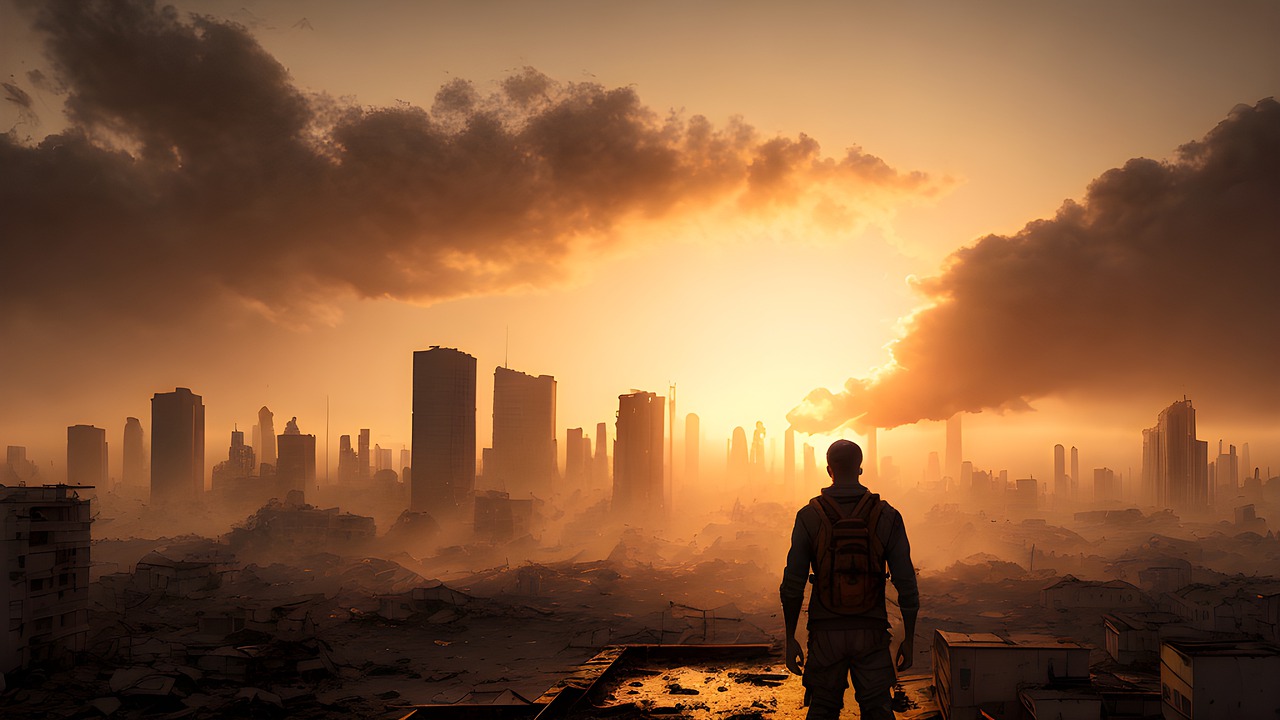
Surviving a world-shattering event from the midst of a perilous city requires a completely distinct mindset.
In order to stay alive, it requires a specific set of survival skills, tools, and plans.
Even if you are not residing or working in a densely populated county, it is possible that you have a relative who does.
Perhaps you visit a nearby high-density city on occasion to see your kids, friends, or relatives.
In essence, what matters is:
If a situation where everything goes wrong occurs and you find yourself in a city, either as a resident or just for a brief stay, do you possess the necessary skills and knowledge to endure and survive?
Are you aware of the method to effectively navigate through such a setting?
In the event of a disaster, your initial priority should be to return home, unless your dwelling has been destroyed.
The reason is that is where the majority of our survival gear and resources will be stored.
Unless you are unable to get home first, they are not very useful to you.
If a disaster occurs, you should assume that you will not be at home.
It is possible that you might be… however, it is advised not to make assumptions.
This assumption assists you in getting ready for that particular situation.
Therefore, it is essential to possess a well-prepared Get Home Bag.
Now, this bears little resemblance to a “Bug Out Bag” (BOB).
A BOB is typically a spacious backpack that is kept at home and filled with various survival gear.
After a disaster, it is utilized as a means to escape from danger.
On the other hand, a “Get Home Bag” is compact, lightweight, and uncomplicated.
Please follow these directions carefully in order to complete the task accurately.
It makes sense to have several dispersed in strategic areas.
One can be kept in the car, one can be kept in the office, one can be kept on the boat, one can be kept in the RV, and so on.
To ensure a quick return to your home base, it is essential that a get home bag includes the necessary resources.
The following list outlines the most frequently encountered items found in a get home bag.
- Spare Cash
- Everyday Carry Knife
- Maps (of the city and surrounding areas)
- Military Compass
- Everyday Carry Flashlight
- Small First Aid Kit
- Hand Crank Radio
- Protein Bars
- Water and Portable Water Filter
- Lockpicking Set
The purpose of having a Get Home Bag is to facilitate your journey back home.
When you’re away from your home base, having basic survival gear will provide you with a slight advantage.
Rendezvous Points
Now that you have obtained a Get Home Bag, what occurs in the event that your home base is ruined or no longer a safe place?
- Do you have a backup rendezvous location?
- Have you shared this location with your loved ones?
During an urban emergency, it may not be possible to contact your family and friends to coordinate a meeting place when you are attempting to stay alive.
- The kids might be at school.
- Your significant other may be at work across town
- You might be at the dentist.
Planning ahead and designating a meeting point is preferable.
However, it needs to be located in a place that is easily remembered.
If everyone forgets where the meeting place is, then this does not work.
If you trust them, you can select someone else’s house, schools, or landmarks as options for your choice.
Let’s go through the text systematically, ensuring that everyone understands the same information without adding or removing any details.
At this location, you can also engage in some rendezvous drills.
Hunker Down or Bug Out
This is the next significant decision you must make.
It is natural to have the desire to get as far away from the city in a prolonged disaster, thinking step by step.
Although not something you should follow in every circumstance, it is important to think step by step.
After arriving home, make sure to look up the news and engage in conversations with your neighbors in order to collect additional information.
There are certain factors to consider.
- What is your emergency food stock looking like?
Your capacity to survive at home for a longer period of time will depend on the amount of food and water you have stored.
The higher your chances of survival, the better your stockpile.
- How serious is the disaster or emergency?
If it is a localized natural disaster of shorter duration, you will most likely be able to wait it out.
If the situation is perilous and expected to persist, perhaps the optimal choice is to seize your prepared bug out bag and depart.
Alternatively, bugging out could be considered an impulsive decision given that the situation may instead present a serious (albeit momentary) emergency.
- Are government institutions still functioning?
If there are no police officers, firefights, paramedics, and EMTs, the situation will deteriorate rapidly.
It is certain that unforeseen events will occur.
And emergencies and disasters tend to make them happen more often.
Your decision may be influenced by unforeseen events.
Be prepared for unexpected situations that could either make you leave the city or confine you to your home.
In order to come up with a wise decision, it is necessary to carefully consider and determine whether it is more advantageous to stay indoors (bug in) or leave the current location (bug out).
Urban Survival Planning and Preparation
Assuming you make the decision to hunker down, let’s proceed step by step.
The main danger to survival in an urban environment is the large number of individuals competing for the available resources.
To ensure your survival in such an environment, ensure that you acquire all these skills by thinking in a step-by-step manner.
1– Begin by identifying urban water sources, as they can be found even in cities. These sources may consist of water heaters, toilet tanks (excluding the bowl), rainwater, and irrigation sources. Additionally, make sure to explore the existence of water storage systems. Familiarize yourself with the usage of a silcock ring since several water sources in urban areas necessitate its presence.
Here is a step-by-step rephrasing of the text: 2– Purify and filter water: Begin by boiling water. Add a small amount of bleach. Employ filters. Acquire knowledge on creating homemade water filters. Utilize water purification tablets.
3– Search for food: In urban environments, there may not be enough space to store a large amount of food. Over time, the stored food will be depleted, requiring a search for additional sources. It might be necessary to lower your expectations when seeking out food in the city. By utilizing some strategic thinking, you can determine where to find food, as a significant amount of it is usually wasted or discarded. Nevertheless, certain areas within the city may have edible plants growing, although it may be prudent to enhance your knowledge of identifying which plants are safe to consume.
4– First Aid: In addition to basic bandage application, it is essential to possess advanced first aid knowledge. Being able to effectively address severe injuries and combat bacterial illnesses is crucial.
When it comes to self-defense, it is advisable to undergo training courses in person rather than relying on YouTube videos. Although there are many individuals providing defense technique videos, it is important to be cautious as their methods might lead to harm. Therefore, exercising common sense is essential when exploring self-defense options. The most effective forms of self-defense are typically straightforward and aggressive, just like Bruce Lee who used any means necessary, including biting, in a fight. Additionally, non-lethal tools like pepper spray can be excellent choices. It is also crucial to develop skills in situational awareness and consistently practice it. Aiming to be aware of one’s surroundings is the initial step to prevent conflicts.
6– How to create makeshift weapons: Similar to how Jason Bourne wields a rolled up magazine or John Wick employs a pencil, various ordinary objects can be transformed into weapons. It may be necessary to utilize whatever is readily available.
Step 7: Gain knowledge on becoming a gray man: The key is to assimilate with your surroundings, avoiding attracting notice. Acquire the skill of navigating urban areas by melting into the multitude. This activity can be enjoyable when practiced alongside friends or family.
If you are in a situation where you cannot stay in your home, it is important to find or construct shelter. Knowing how to locate or create shelter is crucial for survival. It is wise to carry an emergency tent or blanket in your backpack as they can be utilized in various ways for building shelter and many other purposes.
9– Waste management: Regardless of the circumstances, the human body consistently operates and generates waste. Failing to manage this waste in a sanitary manner increases the risk of developing severe illnesses. Luckily, contemporary emergency products are available to effectively handle waste and uphold cleanliness in your surroundings.
Having good physical health and being in good shape increases your chances of survival. During an urban collapse, your feet may be your only means of transportation. It is currently the optimal time to improve your strength and stamina. Additionally, even if you never encounter an emergency, you will still be healthy and have a good appearance.
In recent years, we have witnessed several instances of escaping and evading riots, haven’t we? During such chaotic situations, people’s true nature often disappears, and individuality is lost. If you find yourself caught up in a riot or a crowd, it is advisable to leave before the situation gets out of control. However, if you are unable to leave early on, it is wise to utilize your acquired skills of blending in like a gray man and wait for an opportunity to make an exit. Since people’s reactions can be unpredictable, it is important to refrain from doing anything that would attract attention to yourself.
12– It is important to be able to adapt to changing conditions, as you have no control over what happens. By preparing and studying beforehand, you will have a bank of knowledge that can assist you in overcoming issues.




